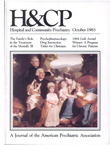Family Educational Intervention in the Treatment of Schizophrenia
Abstract
In the aftermath of deinstitutionalization, when current public policy dictates greater community management of schizophrenia, patients and their families play an increasing role in the treatment of the illness. Since mental health professionals often neglect to educate them on the causes, symptoms, and treatment of schizophrenia, patients and their families are often misinformed, fearful, and ill-equipped to aid in treatment. The authors describe a brieffamily educational intervention and the questionnaire that was used to compare the knowledge of patients and their families who received the intervention with the knowledge of those who did not. The findings suggest that patients and their families in family treatment programs can acquire and retain information about schizophrenia more readily than patients and families involved in individual treatment. This knowledge enables them to become more effective participants in aftercare and helps surmount the problems associated with posthospital adjustment.
Access content
To read the fulltext, please use one of the options below to sign in or purchase access.- Personal login
- Institutional Login
- Sign in via OpenAthens
- Register for access
-
Please login/register if you wish to pair your device and check access availability.
Not a subscriber?
PsychiatryOnline subscription options offer access to the DSM-5 library, books, journals, CME, and patient resources. This all-in-one virtual library provides psychiatrists and mental health professionals with key resources for diagnosis, treatment, research, and professional development.
Need more help? PsychiatryOnline Customer Service may be reached by emailing [email protected] or by calling 800-368-5777 (in the U.S.) or 703-907-7322 (outside the U.S.).



